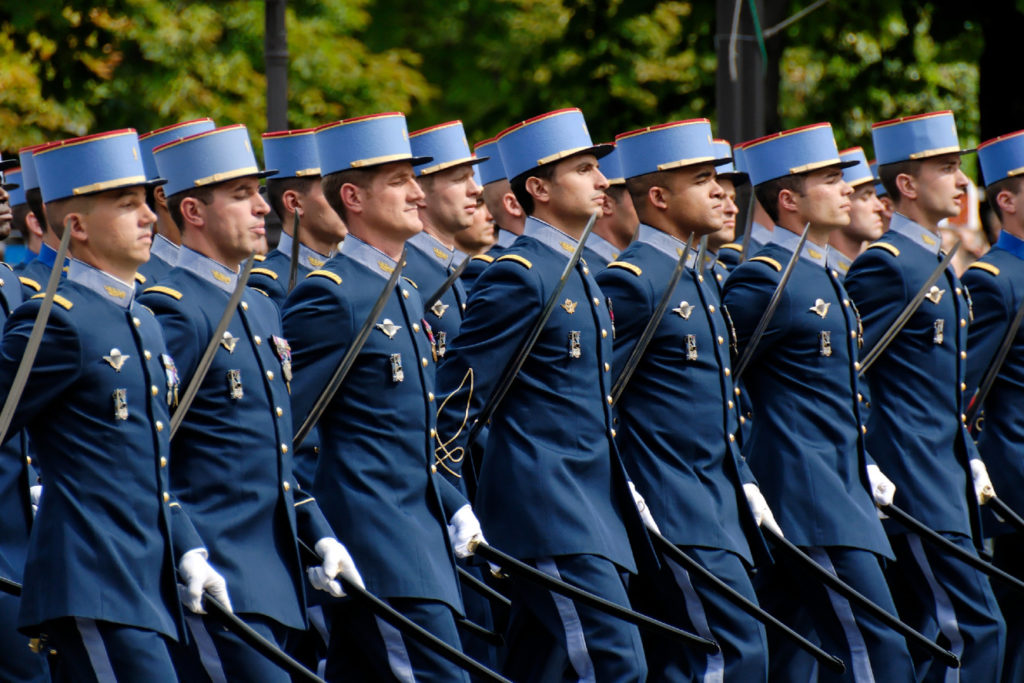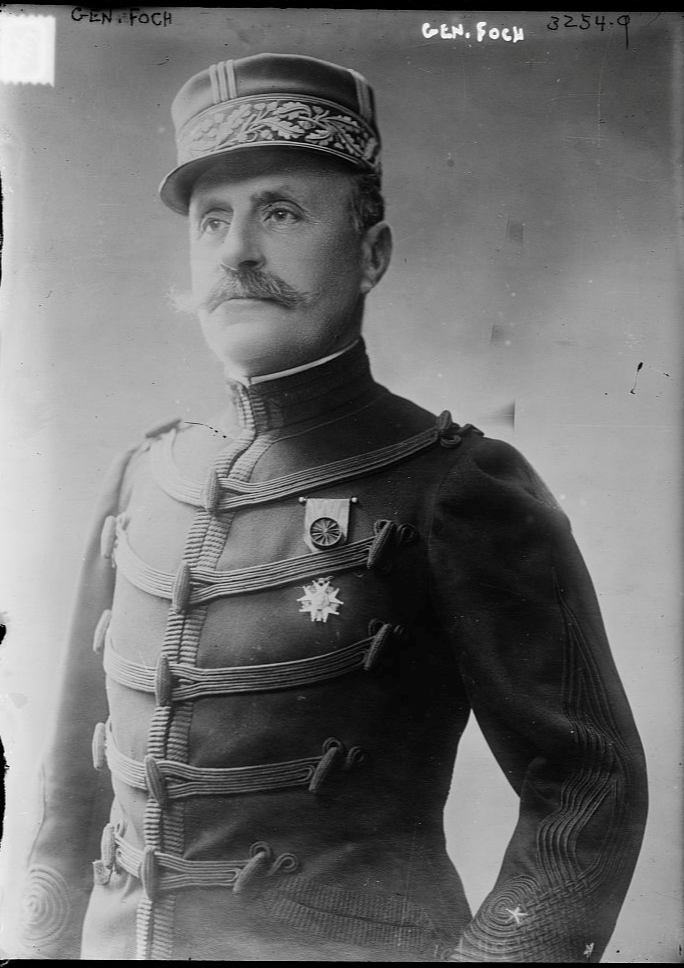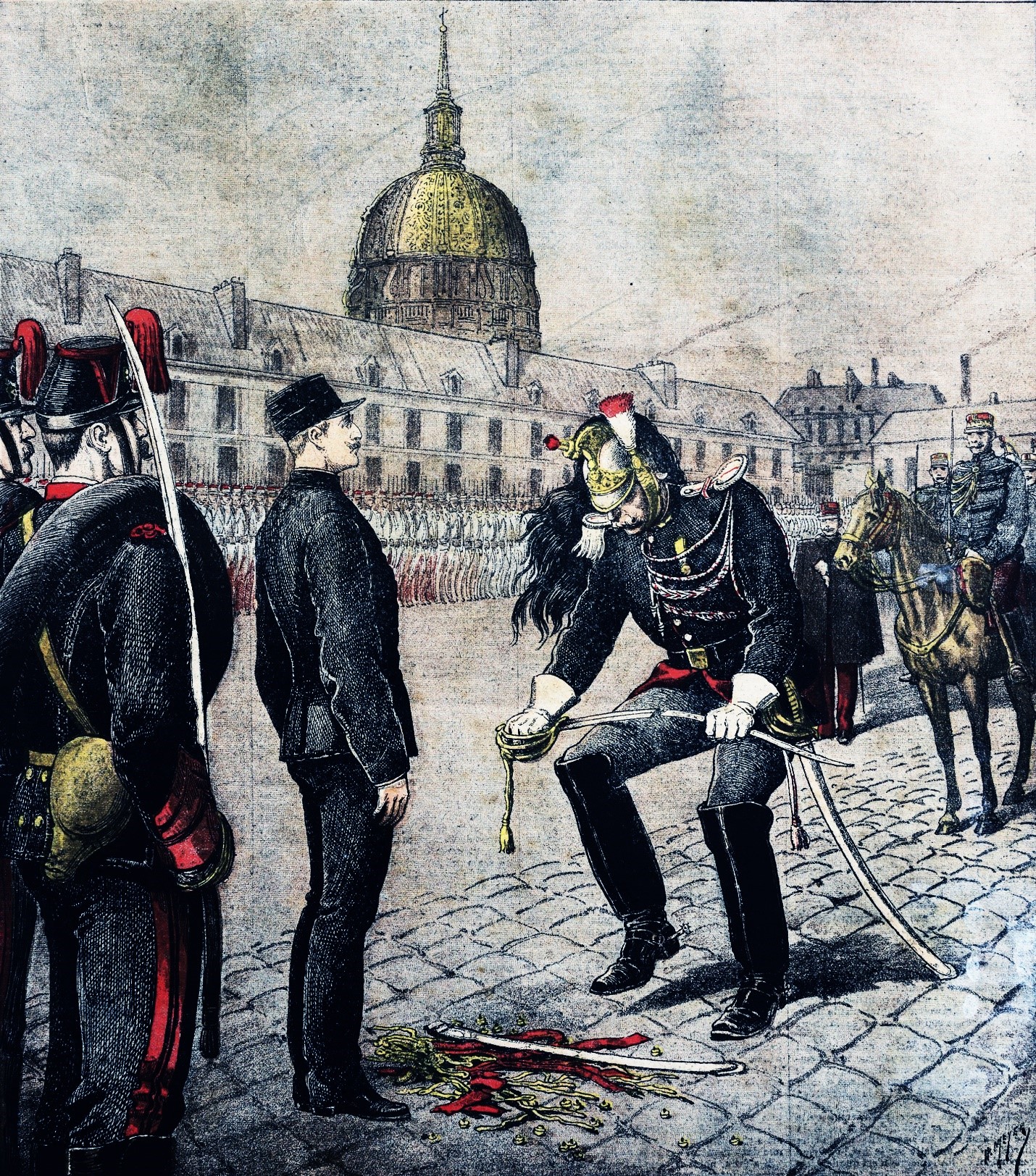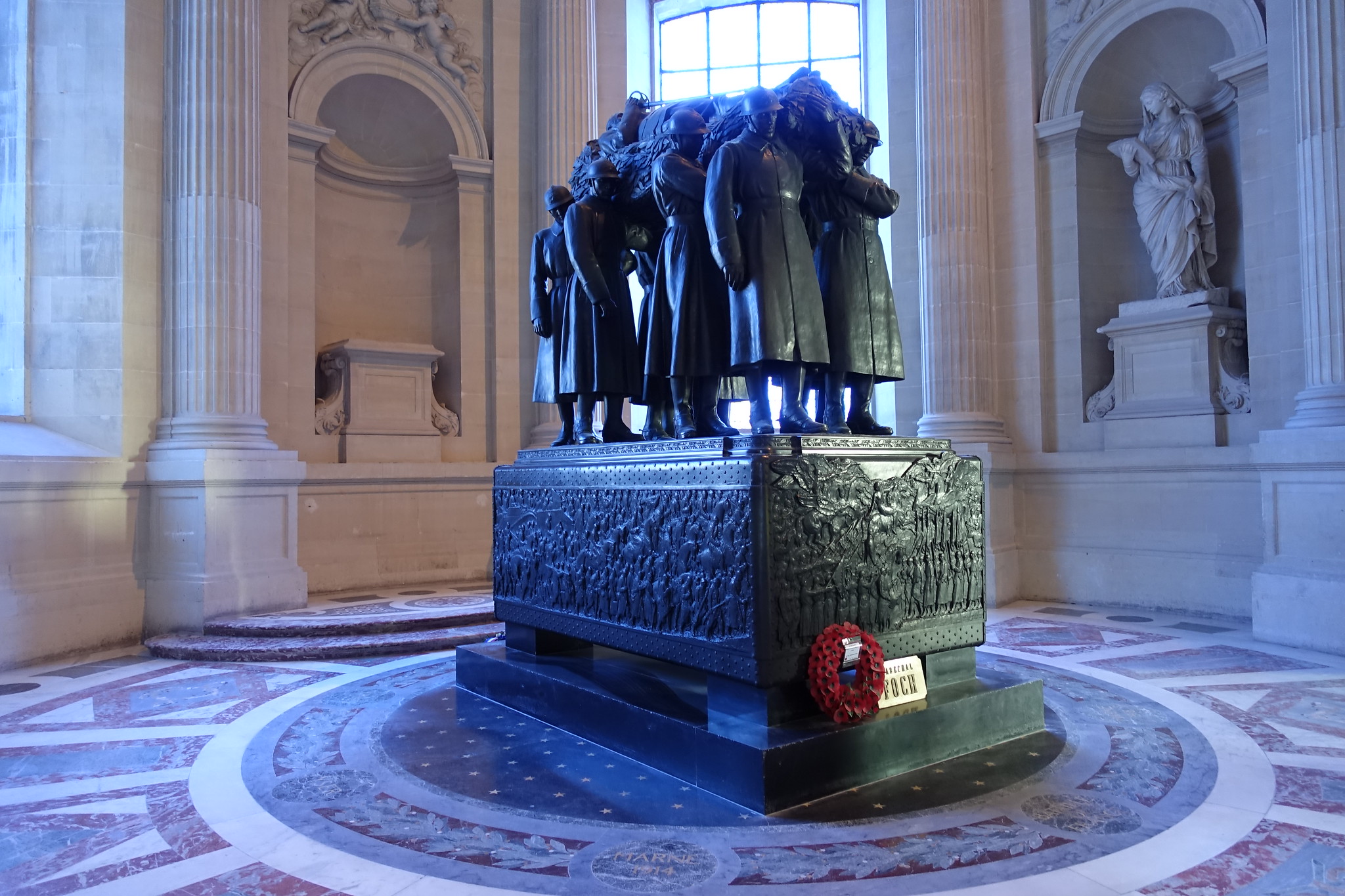Modern War for Romantics: Ferdinand Foch and the Principles of War

There are three reasons Americans should study French military strategy. The first is that the French military has an intellectual tradition that stretches back at least to the 18th century, and more than a few French military theorists draw on that tradition and are enriched by it. Their work is sophisticated, and they write well. Second, the disastrous losses that Americans too often associate with the French military and that encourage them to dismiss the French should do the opposite; the failures make the French worth reading. Every generation of French officers since the catastrophe of the Franco-Prussian War has had to grapple with failure and think hard about the challenges of modern warfare. Third, relatedly, the French view everything from the perspective of scarcity, meaning they assume they have to compensate for a lack of resources with smarts and courage, and by making the most of what they have.
All three factors were apparent in June of last year, when the French army’s doctrine center, the Centre de doctrine et d’enseignement du commandement, organized a conference on the “Principles of War in 2035.” The focus of the conference obviously was on the future, but one could not talk about the future without drawing on the wisdom of the past, even if only for conversation’s sake. The conference location made it hard to do otherwise: The center is located on the 18th-century campus known as the École Militaire, in central Paris near Les Invalides (the site of Napoleon’s tomb and the army’s excellent history museum). The École Militaire is also home to France’s École de Guerre, where generations of rising French officers have come to study (and where Capt. Alfred Dreyfus was stripped of his rank and had his sword ceremonially broken, but more on him later). Engaging with the French military’s intellectual tradition, however, was also part of the point of the conference. The giveaway is the title, for when the French talk about the “Principles of War,” they are referencing a line of thinking that stretches back to a specific book and the man who wrote it.
The book is On the Principles of War, first published in 1903. It is the touchstone of modern French military doctrine, a primary reference for the French army’s most recent high-level doctrinal publication, Future Land Action (2016), and the beginning of French conversations about strategy regardless of whether or not readers agree with the book or like it. Indeed, some of the book’s influence is due less to its intrinsic qualities than to the prestige of its author, Marshal Ferdinand Foch (1851–1929). Foch was the Supreme Allied Commander in 1918, making him France’s most accomplished general of the past century and the man who led France to victory at the end of its bloodiest war. He is France’s Eisenhower and Grant rolled into one. He also had intellectual predilections: He served as a professor at the École de Guerre, and later was its director (his office when he was director currently is occupied by the commanding general of the Centre de doctrine et d’enseignement du commandement). For those of us who wish to understand French military thinking, the place to start is with Foch.
Foch’s reputation in France is not without blemish, owing mostly to his association with Carl von Clausewitz’s Romantic vision of total war as well as his contribution to the “offensive à outrance” (offensive at all costs) school of thinking. These are often blamed for the carnage of the Western Front, especially the foolhardy campaigns of 1914 and 1915, which took place before many commanders on all sides, Foch among them, revised their methods and solved the tactical challenges that caused the stalemate. Foch’s most recent French biographer, Jean-Christophe Notin, quipped that “his teachings at the École de Guerre did more to lead to defeat than prepare for victory.”

Marshal Ferdinand Foch. (Library of Congress)
There is some truth to this, especially with regard to his belief in aggressive infantry assaults despite the strong evidence that the firepower of modern weapons greatly favored the defense. However, Notin’s view undervalues the extent to which Foch revised his own ideas about conducting offensive operations. By 1916 he had, for example, embraced Marshal Philippe Pétain’s (1856–1951) mantra, le feu tue (fire kills), and became a devotee of the methodical use of heavy artillery. He also renounced the Clausewitzian search for a decisive battle in favor of an operational approach that consisted of hammering the front at multiple points and obtaining, through the aggregate effect of many limited victories, the desired strategic effect, namely breaking the enemy’s will to fight. Foch, however, never abandoned his faith in the offensive, which distinguished him from the cautious, defensively minded Pétain. If we expand our scope to include France’s greatest military tragedy, 1940, we see that the problem was not Foch’s influence but rather the lack of it. As both Robert Doughty and Michel Goya have noted, it was the longer-lived Pétain, and not Foch, who had the greatest influence over military thinking on the eve of World War II. More specifically, it was the dour Pétain’s interpretation of the lessons of World War I that encouraged the French army to shelter behind the Maginot Line and renounce offensive capabilities. In Doughty’s words, “one only has to read the minutes of the Superior Council of War’s meetings in the interwar years to weigh the different effects of the two men and to consider how different things could have been had Foch wielded the most influence.” After 1940, the parts of the French army that reassembled themselves under the Free French flag restored the connection to Foch, with thinkers like Gen. André Beaufre (1902–1975) serving as a bridge.
Clausewitz and the Romantic Critique of the Franco-Prussian War
It is true that at the heart of Foch’s thinking about war is a Romantic interpretation of “modern” warfare that owes a lot to Clausewitz as well as ambient French Romanticism, which encouraged rejection of materialist or positivist philosophies and valorized spirit and will. Foch was no partisan of the French Revolution’s social-democratic and anti-clerical agenda. On the contrary he was a conservative Catholic who lost his first teaching job at the École de Guerre as part of an anti-clerical purge, and he was almost certainly anti-Dreyfus. (France at the turn of the 20th century split over belief in the guilt or innocence of Dreyfus, who was Jewish, accused of leaking military secrets to the German government. The dividing line, however, reflected a cultural war, as Jews in post-1789 France served as a stand in for modernism, capitalism, positivism, and the republic; to be anti-Dreyfus was to be some combination of anti-Semitic, anti-liberal, and anti-modern.)

“The traitor: Degradation of Alfred Dreyfus, in the Morland Court of the École Militaire in Paris,” Henri Meyer. (Image courtesy of Bibliothèque nationale de France)
But like many conservative Catholics he nonetheless saw in the revolution an important world-historical event, which he celebrated in his Principles as a triumph of the spirit. It was the birth of France as a nation, which he conceived of in terms of a spiritual community in a manner akin to the Romantic Johann Gottlieb Fichte, as opposed to the more rationalist and positivist Ernest Renan. The revolution was also, to borrow a late 20th-century term, a revolution in military affairs. The nation at arms, supercharged by spirit, swept aside the professional armies of the old monarchical regimes of the 18th century. Foch cited Clausewitz, who summed up matters in the following terms:
The French Revolution, through the force and the energy of its principles, through the enthusiasm to which it brought the people, threw the entire weight of the people and all its forces into the balance, where before only reduced arms and the limited revenues of the state had been felt.
Foch, like his peers, identified the root cause of France’s defeat in 1870 as a spiritual failing that translated into passivity and the lack of will to fight. Citing the conservative Catholic philosopher Joseph de Maistre, Foch wrote, “A lost battle is a battle one believes one has lost, for […] a battle is not materially lost.” For Foch, the opposite was also true: “A battle won is a battle in which one does not admit defeat.”
Wars for Foch were contests between wills; the most obstinate wins. But they were also fundamentally about aggression. If you want to push your enemy back, “hit him, otherwise nothing is done, and to that end there is only one means: battle.” Foch, Clausewitz student that he was, declared the objective of battle to be destroying the enemy’s forces. “Modern warfare cannot understand arguments other than those that led to the destruction of the [enemy’s] army: the battle, the toppling by force.” With profound admiration he cited Clausewitz’s appreciation of Napoleon:
Bonaparte always marched straight to his goal without worrying about the enemy’s strategic plan. Knowing that everything depended on the tactical results and never doubting achieving them, he ceaselessly and always sought opportunities to fight.
The Principles of War
Notwithstanding Foch’s apparent endorsement of the “never mind maneuvers, always go straight at ‘em” approach so dear to Patrick O’Brian’s Jack Aubrey, Foch believed that strategy boiled down to maneuver. But the maneuvering had to be for the sake of setting up the decisive attack. This was an important distinction for him, given his condescending view of pre-1789 commanders, whom he compared to fencers who maneuvered to score points rather than kill. In contrast, Napoleon maneuvered to kill. Foch believed he could teach the art of maneuvering to kill by studying not formulae for victory but rather fundamental “principles of war” that he believed should guide commanders’ analysis of how to proceed. Foch’s catchphrase was said to have been “De quoi s’agit-il?” meaning “What’s it all about?” The idea is to think and adapt rather than do anything mechanically, an imperative that gave commanders full license, for example, to abandon the disastrous tactics of 1914 and try something else.
Contemporary French military treatments of Foch associate him with three principles, which probably are what most French officers would say if quizzed about Foch: economy of force, concentration of efforts, and liberty of action.
This is a distillation of Foch’s 1903 work, in which he identified several more and hinted at the existence of others. Foch was, it must be said, a poor writer, and his work invites simplification. What he actually wrote is this: economy of force, intellectual discipline, liberty of action, security, strategic surprise, and the decisive attack.
Let us review these principles briefly.
Economy of Force
Foch explained “economy of force” with what he said was a Latin aphorism that “one does not hunt two hares at the same time.” Elaborating on the idea, he defined economy of force as the “art of [dispersing one’s efforts] [ in a profitable manner, of getting the greatest possible benefit out of the resources one has.” One must also be mindful of the corollary principle, which Foch never in fact names but discusses at length: concentration of efforts. He explained:
The principle of economy of force, it is […] the art of spending all of one’s resources at a certain moment at a certain point; of applying [to that point] all of one’s troops, and, for this to be possible, of keeping them always in communication with one another instead of compartmentalizing them or affecting them to a fixed and invariable destination; then, once a result is obtained, to have them once again converge and act against a new unique objective.
This approach also held the secret to taking down a larger opponent: One only needs superior numbers at a specific point and can keep targeting points where one has the advantage. He cited Napoleon:
When, with fewer forces, I was in the presence of a large army that threatened to overwhelm mine, I fell like thunder on one of its wings and I knocked it over. I then profited from the disorder that this maneuver never failed to create in the enemy’s army, to attack another part, always with all of my force. I fought him piece by piece, and the victory that resulted, was always, as you see, the victory of the larger number over the smaller.
Scaled up to the operational level, this form of martelage (hammering) describes Foch’s approach to breaking the Germans after turning the tide in August 1918.
Intellectual Discipline and Liberty of Action
Foch argued for what later would be referred to by Americans as mission command, and, in the French army, the principle of “subsidiarity,” which boils down to the idea that an officer should communicate his general intent to his subordinate officers, but leave to them the authority and autonomy to figure out the best way to fulfill it. For this to work, commanders have to be capable of “active discipline” as compared to “passive obedience.” Foch saw this as essential for maintaining “liberty of action.” Otherwise, commanders too often would be incapable of fulfilling the will of their superiors because of the circumstances in which they find themselves, or because of the actions of the enemy. They also needed to have the discipline not to think they knew better, or to take it upon themselves to attempt to achieve an objective other than what had been communicated to them.
Security
Just as when one walks through a dark house one extends one’s arm in front to guard against walking into obstacles, Foch wrote, an army must deploy a force ahead as well as to the sides and rear. The objective is to protect the major portion of the force, the gros, from being forced to react and thereby losing its liberty of action. One “constantly has to seek to create events, and not be subject to them.” If and when the avant-garde encounters an enemy force, it should be able to determine the nature of that force and thus the best response to it: Attack? Ignore? Block? The avant-garde needs to encounter the enemy far enough away to offer the gros time to react as the commander wishes. Any closer and the gros might be forced to react. Too far away and dispersed elements might not be able to concentrate, if desired.
Foch’s discussions of the avant-garde show the importance of his arguments about intellectual discipline. Detachment commanders needed to understand fully their role and how it contributed to the larger mission. Otherwise they risked straying too far, or too close, or mistaking their duty: resisting when they should maneuver or attacking when they should hold their ground. Foch himself made that mistake on Aug. 20, 1914, when he disobeyed orders and attacked German positions at Morhange, when he had been told to hold.
Strategic Surprise and Decisive Attack
Strategic surprise and decisive attack are closely related. Though Foch spoke of the need for decisive battles with language that evoked the physical destruction of the adversary’s armies, he was really interested in imposing upon the enemy a psychological effect that was analogous to the effect ideally brought about by a surprise: namely, a combination of terror and paralysis. You do not actually have to kill the enemy; you do not even literally have to surprise them. You only have to make the enemy feel powerless in a way analogous to being surprised.
Foch envisioned a kind of warfare denoted by the term “battle-maneuver.” It combined his vision of striking at the right point with the principle of economy of force, and the idea of dividing up the forces to ensure that the gros is ready, in reserve, to provide the commander with a hammer to strike at the right place and right time. “In the battle-maneuver, the reserve is the mass prepared, organized, reserved and carefully maintained to execute the one act of the battle from which one expects a result, the decisive attack,” Foch wrote. His vision of “battle-maneuver” featured small units advancing under cover, protected by fires, supporting one another, and always working to preserve their liberty of action while denying it to the enemy, and organizing “…above all the [decisive] attack, with the rest becoming subordinate and only considered from the perspective of the advantage they would offer the attack.” The first rule, however, was to keep attacking. The worst thing to do would be doing nothing: “Of all mistakes one alone is infamous, inaction,” he repeated.
Foch at War
Using Elizabeth Greenhalgh’s masterful biography Foch in Command as our guide, we find that Foch, like World War I’s other successful commanders on both sides, adapted his methods over the course of the war as he learned to overcome its many tactical challenges (Michel Goya’s work on the French army from 1914 to 1918 also is highly instructive in this regard.) Foch backed away from the more enthusiastic arguments in Principles regarding offensive operations and especially his article of faith that modern weapons gave the attacker an advantage over the defender. Though, to be fair, elsewhere in Principles he acknowledges that because of modern weapons infantry could not attack as they had before. They had to eschew close formations and make use of all available cover; their path, moreover, had to be prepared by artillery. The difference lay in his estimation of precisely how much firepower this required: As he himself came to realize in 1914 and 1915, he had been off by an order of magnitude at least. Meanwhile, in 1918 he made deft use of economy of force and concentration of force (thanks in large part to logistical capabilities that facilitated the quick movement of divisions by rail and truck up and down the front) to deny the Germans liberty of action. In the process he did not destroy the German army; he convinced its commanders further resistance was futile.

Foch’s tomb at Les Invalides. (Photo by Guilhem Vellut)
Foch Today: Plus Ça Change?
Warfare obviously has changed a lot since 1918, not to speak of 1903, when Foch penned Principles. In the preface to the fifth edition, dated September 1918, Foch looked back on all the innovations he had witnessed. So much had changed. And yet, nothing had:
The fundamental truths that govern the [art of war] remain immutable, just as the principles of mechanics always govern architecture, regardless of whether one is building with wood, stone, iron, or reinforced concrete; just as the principles of harmony govern music whatever the genre might be. It is therefore still necessary to establish the principles of war.
The French army is inclined to agree, by affirming Foch’s premise that there are in fact principles of war and continuing to enshrine Foch’s. It places Foch’s principles at the heart of its doctrine, or rather at the pinnacle of its “hierarchy of norms” as spelled out in the 2016 Future Land Action. More specifically, the French army today recognizes five principles of war. The first three are straight Foch: liberty of action, economy of means, and concentration of efforts. To these the French have added two more, reportedly derived from the 1992 book on strategy by Adm. Guy Labouérie (1933–2016). These are “uncertainty” and foudroyance.
Uncertainty quite simply is something one most go to great lengths to cultivate among one’s adversaries: uncertainty about what one is doing and going to do, where, when, and why. Foudroyance, derived from the word for thunder (foudre), means a sudden crippling shock. In truth, it amounts to a rephrasing of Foch’s principle of strategic surprise. To cite Labouérie (who mentions Foch but does not take up his principles specifically):
The principle of foudroyance has as its goal not destroying everything, which is without interest in any conflict, but breaking the rhythm or rhythms of the Other in its diverse activities, in such a way as to keep it from pulling itself together and to keep it a step behind the action.
To do that, one must strike at the right moment, at just the right place, where the effect would be to block the enemy’s attempt to retake the advantage or restore cohesion.
At the 2019 “Principles of War in 2035” conference, participants discussed whether or not new technologies, new forms of conflict, and new contextual realities (such as new political landscapes, the role of the media, and the much smaller size of most militaries) had changed or would in the foreseeable future change warfare so significantly as to make Foch finally useless. In essence, the answer was no, although participants agreed that commanders today and in the near future would have to change how they applied Foch’s principles. To some extent, the old terms mean different things or imply different courses of action. Liberty of action, for example, now requires access to information and protection of information networks. It also requires political legitimacy, especially since often it is public opinion at home that limits commanders’ choices and confines their liberty of action. Indeed, politics weighs far more heavily on military operations now than in Foch’s day. Also, modern forces are smaller and more likely to be dispersed to a far greater extent than Foch had in mind, giving new importance to economy of means and concentration of efforts. Information networks can facilitate both, though they will challenge command-and-control practices while also becoming a potential vulnerability (Gen. Guy Hubin’s 2003 Perspectives Tactiques stands in the French army as the most influential vision of how networked technology will affect ground operations). Concentration of efforts must also take into account the fact that more often than not military operations are conducted by coalitions. Conference-goers also suggested that recent evolutions oblige the adoption of new principles. Proposed examples include agility, comprehension, proportionality, and resilience. Similarly, French army doctrine itself evokes “legitimacy of action” and “reversibility of action.”
Beaufre perhaps said it best when he wrote that Foch’s principles have the advantage of being sufficiently abstract as to remain universally valid, though he complained that they were too abstract to have any practical application. Nonetheless his own work reflects a strong influence by Foch, and it seems that today the French army at least has inherited a measure of Foch’s aggressiveness. France’s 2013 intervention in Mali, for example, featured a rapid series of aggressive maneuvers that demonstrated a will to deny the enemy liberty of action and, in effect, cripple it through sheer relentlessness and speed. In that sense, the Mali war bore a remarkable resemblance to Foch’s vision of future combat in 1903 and the great counter-offensive of the autumn of 1918. Foch’s principles also make particular sense given the French army’s lack of resources, compared not just to the U.S. military but even the French army of Foch’s day. Economy of means when means are limited is not a thought exercise. Foch above all counseled fighting smart, and trying always to answer “de quoi s’agit-il?” even if this amounts to nothing more than the imperative to take a moment and think through what one is trying to achieve. This seems self-evident, but recent American military history suggests civilian and military leaders could benefit from the reminder.
Michael Shurkin is a senior political scientist at the nonprofit, nonpartisan RAND Corporation.
Image: Marie-Lan Nguyen

